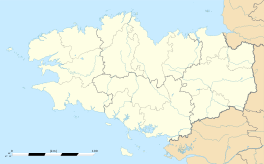Le Faouët, Morbihan
|
Le Faouët Ar Faoued |
||
|---|---|---|

Covered market
|
||
|
||
| Coordinates: 48°02′02″N 3°29′25″W / 48.0339°N 3.4903°WCoordinates: 48°02′02″N 3°29′25″W / 48.0339°N 3.4903°W | ||
| Country | France | |
| Region | Brittany | |
| Department | Morbihan | |
| Arrondissement | Pontivy | |
| Canton | Le Faouët | |
| Intercommunality | Pays du Roi Morvan | |
| Government | ||
| • Mayor (2008—2014) | André Le Corre | |
| Area1 | 34.03 km2 (13.14 sq mi) | |
| Population (1999)2 | 2,806 | |
| • Density | 82/km2 (210/sq mi) | |
| Time zone | CET (UTC+1) | |
| • Summer (DST) | CEST (UTC+2) | |
| INSEE/Postal code | 56057 /56320 | |
| Elevation | 53–202 m (174–663 ft) (avg. 152 m or 499 ft) |
|
|
1 French Land Register data, which excludes lakes, ponds, glaciers > 1 km² (0.386 sq mi or 247 acres) and river estuaries. 2Population without double counting: residents of multiple communes (e.g., students and military personnel) only counted once. |
||
1 French Land Register data, which excludes lakes, ponds, glaciers > 1 km² (0.386 sq mi or 247 acres) and river estuaries.
Le Faouët (Breton: Ar Faoued) is a commune in the Morbihan department of the region of Brittany in north-western France.
The Breton language name of the commune means Beech forest. The sixteenth century timber market halls are a noted feature of the town and two medieval chapels lies within the boundaries of the commune.
Le Faouët/Ar Faoued lies in the historical region of Cornouaille. Traditionally a Breton-speaking area, the French language became commonly used from the 1950s. The town lies in the valley of the river Ellé.
Le Faouët/Ar Faoued is the seat of the Canton du Faouët. The other communes making up the canton are Berné, Guiscriff, Lanvénégen, Meslan, and Priziac.
The population at recent censuses was:
Inhabitants of Le Faouët are called Faouëtais.
In 2008, 14,24% of the children attended the bilingual schools in primary education.
The sixteenth century halles, or covered market, remain in use and are a rare surviving example of a large timber structure from the period.
The chapel of Saint Barbara is sited on a hilltop overlooking the Ellé. The fifteenth century chapel of Saint Fiacre was recently restored. The polychrome timber interior was highly regarded, and earned its creator, Olivier Le Loergan, a title of nobility. The stained glass is also noteworthy. Parts of the interior have suffered considerable damage from insects.
...
Wikipedia



